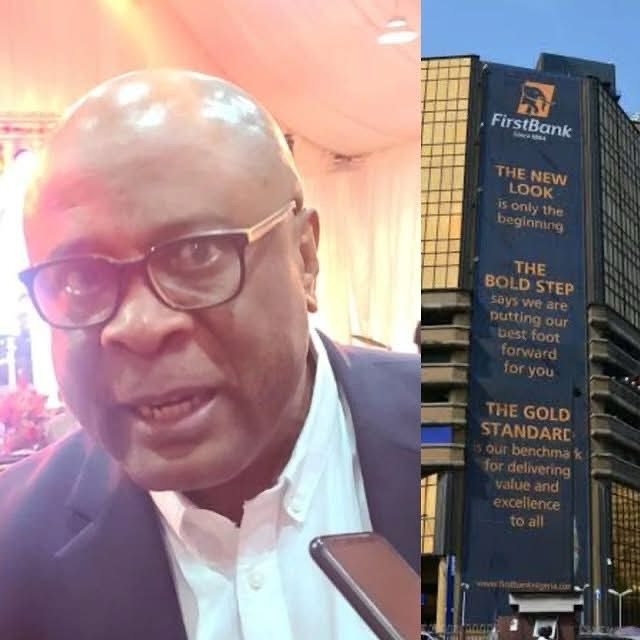An Abia businessman, Eke Agbai Eke, has sued First Bank of Nigeria over an alleged fraudulent withdrawal of N550 million from his fixed deposit account at the bank’s former Abiriba branch, now relocated to Uzuakoli.
In a growing legal saga that has captured public attention, Dr. Eke Agbai, an esteemed businessman and community leader from Abia State, has filed a lawsuit against First Bank of Nigeria over an alleged fraudulent withdrawal of N550 million from his fixed deposit account. The amount in question was deposited at the now-relocated Abiriba branch of the bank. The case, which involves claims of unauthorized transactions and institutional negligence, has sparked concerns over the security of personal banking assets and the accountability of financial institutions in Nigeria.
This article aims to provide an in-depth analysis of the circumstances surrounding this legal dispute, its implications for the banking industry in Nigeria, and its broader social and economic context.
Dr. Eke Agbai, a prominent businessman in Abia State, claims that his fixed deposit of N550 million was withdrawn fraudulently from his account at First Bank’s former Abiriba branch, now relocated to Uzuakoli. According to the lawsuit filed by his legal representative, Ebuka Nwaeze, Agbai’s deposit was initially intended to sustain the presence of First Bank in his local community. The plaintiff emphasized that as a community leader, he viewed his deposit not only as a personal investment but as a contribution to local development, providing a financial backbone for an institution operating in his area.
The events that led to the lawsuit began in December 2023 when Dr. Agbai attempted to access his fixed deposit through the bank’s mobile app, only to discover that he could no longer gain access. His attempts to contact the Business Development Manager of the branch proved unsuccessful, prompting him to visit the Gwarinpa branch in Abuja. Upon inquiry, he was reportedly informed that N550 million had been withdrawn from his account in six consecutive transactions, despite Agbai being in Umuahia at the time of the unauthorized withdrawals.
The discovery of the fraudulent activity sent shockwaves through the Abia business community, particularly given the amount of money involved and the breach of trust between a respected local leader and a major Nigerian bank. Dr. Agbai immediately demanded the liquidation of his fixed deposit. However, despite repeated complaints and requests for action, no resolution was forthcoming from the bank.
The situation grew more contentious when, after several months of waiting, First Bank finally launched an internal investigation. The results of this investigation led to the dismissal of a few senior bank officials who were allegedly connected to the fraudulent withdrawals. However, the bank’s internal response seemed insufficient, considering the scale of the financial loss and the damage to the bank’s reputation in the community.
In the wake of the bank’s failure to resolve the matter, Dr. Agbai took the bold step of filing a lawsuit against First Bank. The case, marked HU/233/2024, is being heard at the Abia State High Court, sitting in Umuahia. During the initial court proceedings, both the plaintiff and the defendant were present in court. Justice U.D. Enwereji, the presiding judge, adjourned the case to allow for a proper hearing and presentation of evidence.
The plaintiff’s legal team has made it clear that they intend to pursue justice for their client, not only to recover the funds but also to hold the bank accountable for its failure to protect the interests of its clients. The hearings are set to resume on March 26 and April 2, with both parties expected to present their respective evidence and arguments.
The case of Dr. Eke Agbai and First Bank is emblematic of a larger issue within Nigeria’s banking sector: the prevalence of fraud and the failure of financial institutions to adequately secure customer funds. Bank fraud, including unauthorized withdrawals, cybercrime, and insider abuse, has become a significant concern for customers and regulatory authorities alike. Despite the strides made in enhancing banking technology and digital services, these security lapses continue to undermine trust in the sector.
In recent years, there have been several high-profile cases of financial fraud, some involving large sums of money. However, the response from banks and the regulatory authorities has often been criticized as slow or insufficient. In Agbai’s case, the delay in addressing the fraud and the initial reluctance of First Bank to take decisive action has raised questions about the bank’s commitment to safeguarding its customers’ assets.
For Dr. Agbai, the case is not just about recovering his N550 million, but also about the wider implications for his community. As a local businessman, he had viewed his deposit as a way to support the presence of First Bank in Abiriba, which he believed would contribute to the economic development of the area. The alleged fraudulent withdrawal not only threatens his financial interests but also raises concerns about the stability and reliability of financial services in rural and semi-urban communities across Nigeria.
First Bank, as a major banking institution in Nigeria, plays a critical role in the economic life of numerous communities. If customers begin to lose faith in the ability of banks to protect their deposits, it could lead to a broader distrust in the financial system, particularly in areas where access to banking services is already limited. This case could serve as a warning to both financial institutions and regulators to take a more proactive approach to fraud prevention and customer protection.
From a legal standpoint, Dr. Agbai’s case against First Bank presents several important questions regarding the responsibilities of banks in ensuring the security of their customers’ funds. If the court rules in favor of Dr. Agbai, it could set a precedent for future cases involving similar allegations of fraud and negligence.
Banks are legally obligated to provide safe custody of customer funds and to take reasonable measures to protect against fraud, both internal and external. In cases where fraud occurs, financial institutions are expected to act swiftly to investigate the matter, notify affected customers, and take appropriate action to recover lost funds. The delay in First Bank’s response, as described by the plaintiff, may be viewed as a failure to meet these legal obligations.
Moreover, the case highlights the need for stronger regulatory oversight within Nigeria’s banking sector. While the Central Bank of Nigeria (CBN) has implemented various measures to combat banking fraud, including the introduction of biometric verification and improved anti-money laundering protocols, the effectiveness of these measures remains in question. It is possible that the current regulatory framework is not robust enough to deter fraud at all levels of the banking system, particularly in cases involving insider collusion.
Technology plays a critical role in modern banking, especially in safeguarding customer accounts from unauthorized access. In this case, Dr. Agbai’s initial discovery of the fraudulent withdrawals occurred when he was unable to access his account through First Bank’s mobile app. This suggests a potential vulnerability in the bank’s digital banking platform, raising questions about the security of mobile banking systems in Nigeria.
As Nigerian banks increasingly rely on digital platforms for transactions, it is essential for financial institutions to invest in cutting-edge security technologies to prevent unauthorized withdrawals and cybercrime. Stronger encryption, multi-factor authentication, and regular system audits are just a few of the measures that could help reduce the risk of fraud. Additionally, greater transparency in how banks handle security breaches and customer complaints could improve trust in the banking system.
The case of Dr. Eke Agbai vs. First Bank of Nigeria has captured national attention, not just because of the significant amount of money involved but also due to the broader questions it raises about the security of customer funds in Nigerian banks. While the legal proceedings continue, this case serves as a reminder to both financial institutions and regulatory bodies that safeguarding customer assets must remain a top priority.
For Dr. Agbai, the outcome of the case will have a profound impact not only on his personal finances but also on his legacy as a community leader. In the coming weeks, the courts will decide whether First Bank is liable for the alleged fraudulent withdrawals and whether its actions, or lack thereof, constitute a breach of its fiduciary responsibilities. Meanwhile, customers and financial professionals across Nigeria will be watching closely, as the case could set important legal and regulatory precedents for the banking industry moving forward.
As the legal battle between Dr. Eke Agbai and First Bank unfolds, it is clear that the case raises fundamental questions about the security and integrity of Nigeria’s banking system. Whether this will lead to more stringent regulatory measures or a renewed focus on customer protection remains to be seen. However, one thing is certain: the case is likely to have far-reaching consequences for the future of banking in Nigeria.
This in-depth analysis of the case between Dr. Eke Agbai and First Bank highlights the significance of the dispute and its potential implications for the banking industry in Nigeria. The outcome of this case could set a precedent for how banks handle fraud and how customers’ interests are protected within the legal framework.
EXCERPT
An Abia businessman, Eke Agbai Eke, has sued First Bank of Nigeria over an alleged fraudulent withdrawal of N550 million from his fixed deposit account at the bank’s former Abiriba branch, now relocated to Uzuakoli.
In his lawsuit, filed by his lawyer, Ebuka Nwaeze, the claimant stated that First Bank has refused to return his deposit, which he originally placed at the Abiriba branch to help sustain the bank’s presence in his community.
The claimant stated that, as a community leader, he viewed the deposit as a contribution to local development.
The alleged fraud came to light in December 2023 when Eke discovered he could no longer access his personal account through the bank’s mobile app and was unable to reach the Business Development Manager.
Upon visiting First Bank’s Gwarinpa branch in Abuja, he was reportedly informed that N550 million had been withdrawn from his fixed deposit in six consecutive transactions—even though he was in Umuahia at the time of the unauthorized deductions.
Following this discovery, Eke demanded the liquidation of his fixed deposit, but months passed without any action from the bank.
After multiple complaints, First Bank launched an internal investigation, which resulted in the dismissal of fewer than nine senior officials allegedly linked to the fraud.
While First Bank’s legal counsel declined to comment, the plaintiff’s lawyers have publicly addressed the matter.
The Abia State High Court sitting in Umuahia has adjourned the case between Dr Eke Agbai and First Bank of Nigeria Ltd. to March 26 and April 2 for the commencement of the hearing.
The case, marked HU/233/2024, centres on Dr Agbai’s claim that First Bank refused to release his fixed deposit of N550m, which he had lodged with the bank’s Abiriba branch to support its continued presence in the community.
During Tuesday’s proceedings, both parties were present in court.
The presiding judge, Justice U.D. Enwereji subsequently adjourned the case to allow for a proper hearing and presentation of evidence.
#FirstBank #Nigeria
Credit: Guardian





